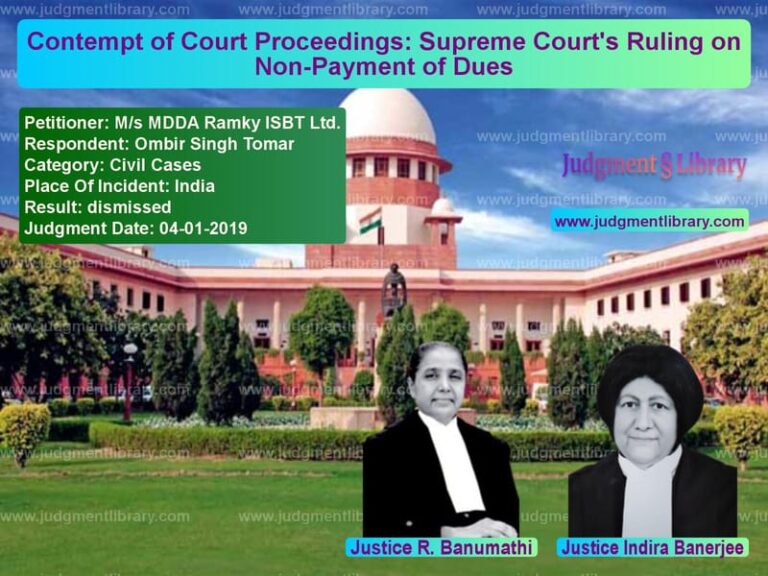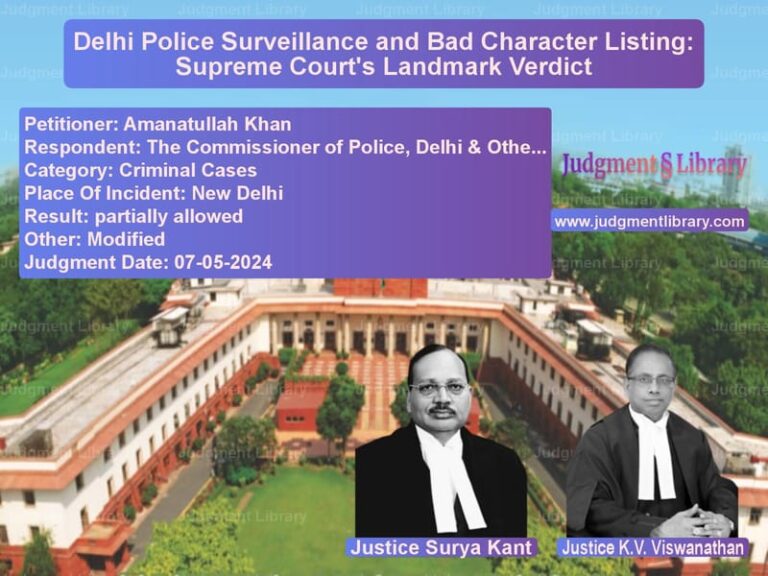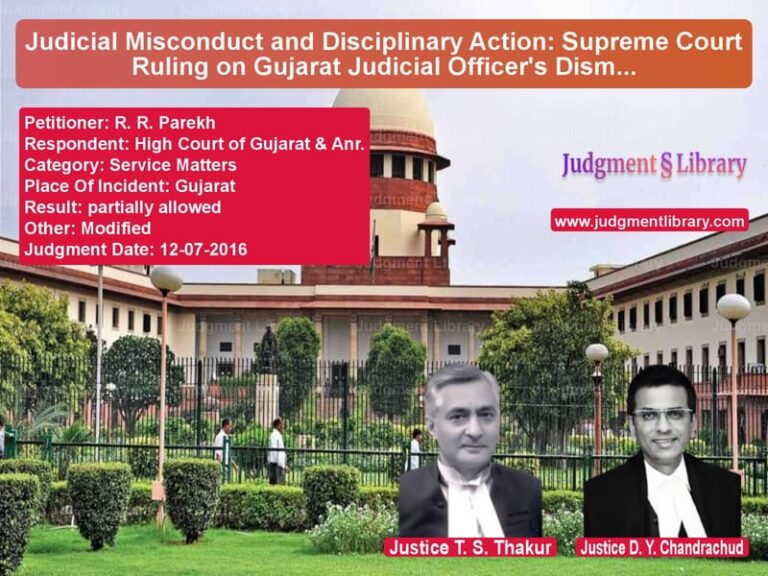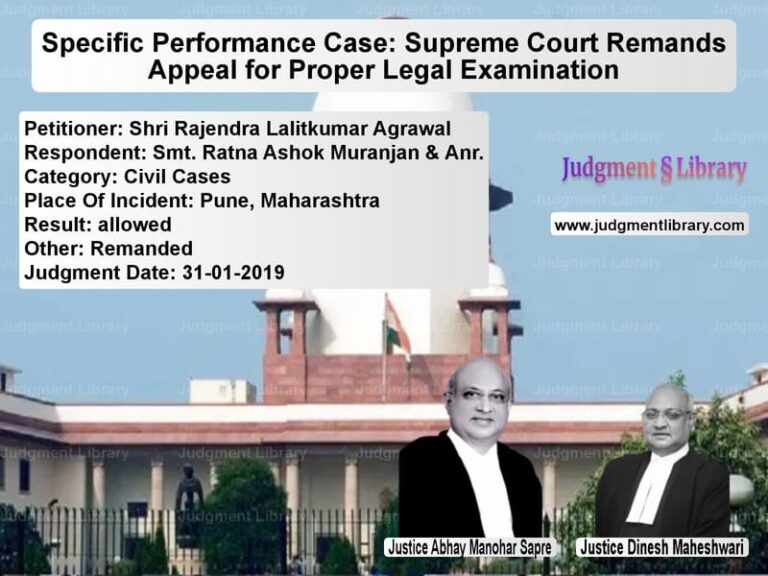Supreme Court Clarifies Transfer of Cases Between States Under a Common High Court
The Supreme Court of India recently ruled on a significant legal issue regarding the transfer of civil cases between states under a common High Court. The case, Shah Newaz Khan & Ors. vs. State of Nagaland & Ors., addressed whether the Gauhati High Court, as the common High Court for multiple states, could order an inter-state transfer of a case under Section 24 of the Code of Civil Procedure (CPC), or if such power was exclusively reserved for the Supreme Court under Section 25 of the CPC.
Background of the Case
The appellants, Shah Newaz Khan and others, had filed a civil suit for declaration of rights and interests in the District Judge’s Court in Dimapur, Nagaland. However, they faced difficulties in prosecuting the case due to alleged hostile conditions. Seeking a fair trial, they filed an application before the Gauhati High Court under Section 24 of the CPC to transfer the case to the District Judge’s Court in Guwahati, Assam.
The Gauhati High Court dismissed the application, ruling that it lacked jurisdiction to order an inter-state transfer and that such a transfer could only be granted by the Supreme Court under Section 25 of the CPC. Aggrieved by this, the appellants moved the Supreme Court, challenging the High Court’s decision.
Key Legal Issue
The main issue before the Supreme Court was:
- Does Section 25 of the CPC grant the Supreme Court exclusive jurisdiction over inter-state transfers, even when both states fall under a common High Court?
- Can a common High Court exercise its power under Section 24 of the CPC to transfer a case from one subordinate court in one state to another subordinate court in a different state under its jurisdiction?
Arguments by the Petitioners
The petitioners, represented by senior counsel, argued:
- The Gauhati High Court has jurisdiction over both Assam and Nagaland, and therefore, it should have the authority to transfer cases between these states under Section 24 of the CPC.
- Section 25 of the CPC applies to cases where different High Courts have jurisdiction over different states, whereas in this case, the same High Court has jurisdiction over both Assam and Nagaland.
- Restricting the power of the common High Court to transfer cases within its jurisdiction would cause unnecessary hardship to litigants, forcing them to approach the Supreme Court for every inter-state transfer.
- Previous decisions by the Bombay and Andhra Pradesh High Courts supported their interpretation that a common High Court could order inter-state transfers within its jurisdiction.
Arguments by the Respondents
The State of Nagaland, represented by senior counsel, countered:
- Section 25 of the CPC clearly states that only the Supreme Court can order inter-state transfers.
- The Gauhati High Court lacked jurisdiction under Section 24 of the CPC because an inter-state transfer is involved.
- The Supreme Court in Durgesh Sharma vs. Jayshree (2008) ruled that inter-state transfers fall exclusively under the jurisdiction of the Supreme Court.
- The petitioners should have directly approached the Supreme Court under Section 25 rather than filing an application before the High Court.
Supreme Court’s Judgment
The Supreme Court, after analyzing the legal provisions, historical context, and judicial precedents, ruled in favor of the petitioners and set aside the Gauhati High Court’s order. The key findings were:
- The power under Section 25 of the CPC is meant for transfers between states with different High Courts. It does not apply to states sharing a common High Court.
- Since the Gauhati High Court exercises jurisdiction over Assam, Nagaland, Mizoram, and Arunachal Pradesh, all courts in these states are subordinate to it.
- Under Article 227 of the Constitution, the Gauhati High Court has superintendence over all courts within these states, and under Article 231, it functions as a common High Court.
- Restricting the Gauhati High Court’s power under Section 24 would lead to unnecessary delays and burden litigants with the requirement of approaching the Supreme Court for every inter-state transfer.
- Judgments by the Bombay and Andhra Pradesh High Courts had correctly interpreted Section 24 to allow inter-state transfers within a common High Court’s jurisdiction.
The Court concluded:
“The power under Section 24 of the CPC can be exercised by a common High Court for inter-state transfers between states under its jurisdiction, as long as the courts involved are subordinate to it.”
Final Verdict
The Supreme Court allowed the appeal and directed the Gauhati High Court to reconsider the transfer application on its merits. It ruled that the High Court does have the power to transfer cases between Assam and Nagaland, as both states fall under its jurisdiction.
Implications of the Judgment
This ruling has far-reaching implications for inter-state judicial administration:
- It clarifies that a common High Court can exercise transfer powers under Section 24 of the CPC for inter-state cases within its jurisdiction.
- It reduces unnecessary burden on the Supreme Court by allowing High Courts to handle inter-state transfers within their jurisdiction.
- It ensures better access to justice by allowing litigants to seek case transfers without having to approach the Supreme Court.
- It sets a precedent for other common High Courts in India, such as the Bombay High Court (for Maharashtra and Goa) and the Punjab & Haryana High Court.
The judgment reinforces the principle that High Courts must be given the necessary powers to ensure effective judicial administration, especially in states sharing a common High Court.
Petitioner Name: Shah Newaz Khan & Ors..Respondent Name: State of Nagaland & Ors..Judgment By: Justice Hrishikesh Roy, Justice Dipankar Datta.Place Of Incident: Nagaland.Judgment Date: 28-02-2023.
Don’t miss out on the full details! Download the complete judgment in PDF format below and gain valuable insights instantly!
Download Judgment: shah-newaz-khan-&-or-vs-state-of-nagaland-&-supreme-court-of-india-judgment-dated-28-02-2023.pdf
Directly Download Judgment: Directly download this Judgment
See all petitions in Contract Disputes
See all petitions in Property Disputes
See all petitions in Dispute Resolution Mechanisms
See all petitions in Specific Performance
See all petitions in Damages and Compensation
See all petitions in Judgment by Hrishikesh Roy
See all petitions in Judgment by Dipankar Datta
See all petitions in allowed
See all petitions in Remanded
See all petitions in supreme court of India judgments February 2023
See all petitions in 2023 judgments
See all posts in Civil Cases Category
See all allowed petitions in Civil Cases Category
See all Dismissed petitions in Civil Cases Category
See all partially allowed petitions in Civil Cases Category







